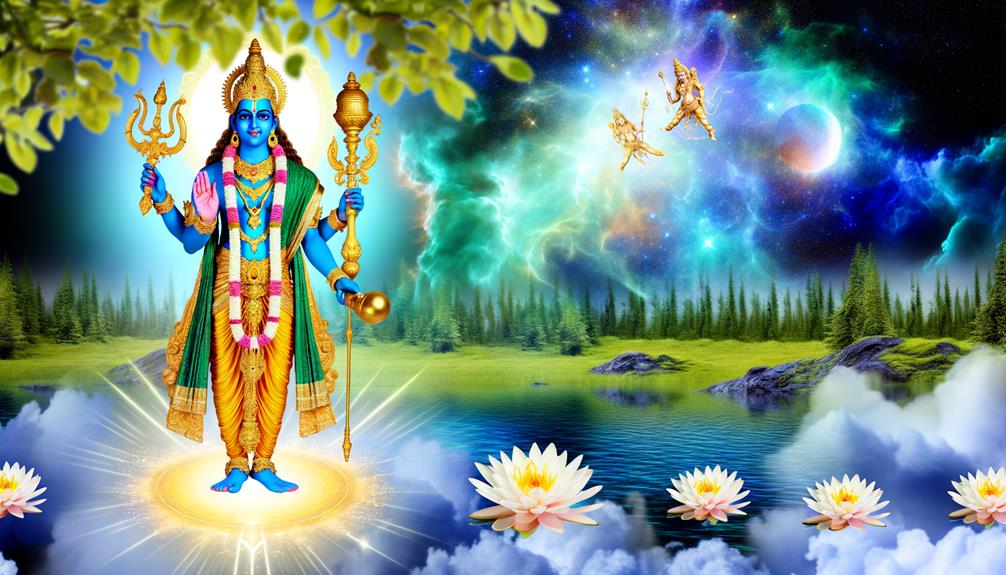Vishnu Name Meaning in English
The name Vishnu, originating from ancient Sanskrit, stems from the root 'viṣ' which signifies pervasiveness and omnipresence. Amplified by the suffix 'nu', it underscores an active, dynamic divine presence.
Vishnu is venerated as the Cosmic Protector, preserver of the Universe, and eternal guardian of cosmic equilibrium. His iconography, featuring a conch and discus, symbolizes his role in maintaining universal order.
Integral to Hindu mythology, Vishnu's avatars, such as Krishna and Rama, illustrate the preservation of dharma. His profound cultural significance impacts global religious practices, art, and literature.
By exploring further, the depth of Vishnu's cultural and spiritual impact becomes evident.

Key Takeaways
- Vishnu's name originates from the Sanskrit root 'viṣ', meaning 'to pervade' or 'to enter'.
- It signifies Vishnu's omnipresence and his role as an all-encompassing divine force.
- The suffix 'nu' amplifies the sense of dynamic activity and presence.
- Vishnu is revered as the Divine Cosmic Protector and preserver of the universe.
- His name symbolizes preservation, stability, and the maintenance of cosmic order.
Etymology of Vishnu
The etymology of the name 'Vishnu' is rooted in ancient Sanskrit, where it is derived from the root 'viṣ,' which carries the connotations of pervasiveness and omnipresence. Linguistically, 'viṣ' implies 'to enter' or 'to pervade,' reflecting Vishnu's role as the all-encompassing divine force.
This semantic foundation underscores Vishnu's philosophical significance in Vedic literature, where he is often portrayed as an all-pervading entity that sustains and governs the cosmos. The suffix 'nu' further enhances the sense of activity and dynamic presence.
This etymological framework is critical for understanding Vishnu's pervasive nature, as it encapsulates his essence as an omnipresent deity, whose influence extends infinitely across the universe, embodying both immanence and transcendence.
Vishnu in Hindu Mythology
Within the vast narrative tapestry of Hindu mythology, Vishnu emerges as a central figure embodying the principles of preservation and cosmic order. Revered as one of the principal deities in the Hindu triumvirate, or Trimurti, Vishnu's role is to maintain the balance of good and evil in the universe.
His presence is integral to numerous mythological accounts, particularly the Dashavatara, where he incarnates in ten distinct forms, such as Rama and Krishna, to restore dharma. Texts like the Vishnu Purana and the Mahabharata elaborate on his divine exploits, portraying him as a compassionate protector of humanity.
Vishnu's consort, Lakshmi, complements his attributes, symbolizing wealth and prosperity, thereby emphasizing his function as the sustainer of life and cosmic harmony.
Symbolic Interpretations
In symbolic terms, Vishnu embodies the role of the Divine Cosmic Protector, a title that underscores his paramount responsibility in maintaining cosmic order and harmony.
As the Preserver of the Universe, Vishnu sustains life and balances the forces of creation and destruction, ensuring the continuity of existence.
These roles are deeply interwoven with the theological and philosophical frameworks within Hinduism, highlighting Vishnu's integral function in the cosmic cycle.
Divine Cosmic Protector
As Vishnu is often regarded as the Divine Cosmic Protector, his symbolic interpretations encompass the preservation and maintenance of universal order and righteousness. This role is deeply embedded in Hindu cosmology, where Vishnu's avatars, such as Rama and Krishna, are seen as manifestations of his divine will to restore dharma (cosmic law) during periods of chaos.
Vishnu's iconography, featuring attributes like the conch (shankha) and discus (chakra), signifies his authority over time and space, reinforcing his protective functions. The conch represents primordial sound, invoking creation and cosmic order, while the discus symbolizes the cyclical nature of the universe and the annihilation of evil.
Through these symbols, Vishnu embodies the eternal guardian of cosmic equilibrium.
Preserver of the Universe
Vishnu's role as the Divine Cosmic Protector seamlessly extends into his identity as the Preserver of the Universe, where his symbolic representations underscore his integral function in maintaining cosmic balance and harmony. This preservation is vividly depicted through various symbols and iconography associated with Vishnu:
- Shankha (Conch Shell): Represents the primordial sound 'Om,' signifying the universe's creation and sustenance.
- Chakra (Disc): Symbolizes the mind and its capacity to control and preserve the cosmic order.
- Gada (Mace): Embodies strength and the power to protect and uphold dharma (righteousness).
- Padma (Lotus): Denotes purity and the unfolding of reality from the cosmic waters.
These symbols collectively illustrate Vishnu's pivotal role in sustaining the universe's delicate equilibrium.
Vishnu's Role in Preservation
Renowned as the preserver within the Hindu trinity, Vishnu's role in maintaining cosmic order and sustaining life is pivotal to the understanding of Hindu cosmology.
Vishnu's divine function involves the protection and preservation of the universe, ensuring the balance between creation and destruction. Manifesting through his ten avatars, or 'Dashavatara,' Vishnu descends to the earthly domain whenever cosmic equilibrium is threatened by malevolence or chaos.
Each avatar addresses specific crises, restoring dharma (cosmic law) and guiding humanity towards righteousness. This cyclical intervention underscores Vishnu's enduring commitment to the sustenance of moral order and life.
Through these divine incarnations, Vishnu exemplifies the continuity and resilience of the cosmic order, a cornerstone of Hindu theological thought.
Cultural Significance
The name Vishnu holds profound cultural significance, deeply embedded in Hindu mythology. Vishnu is revered as the preserver and protector of the universe. His symbolism and attributes—such as the conch, discus, and lotus—represent various aspects of cosmic order and spiritual wisdom.
Moreover, Vishnu's cultural impact extends beyond the Indian subcontinent, influencing global religious practices, art, and literature.
Hindu Mythology Influence
Embedded deeply within Hindu mythology, the name Vishnu carries profound cultural significance, symbolizing the preserver and protector of the universe. Vishnu's influence permeates various aspects of Hindu culture and religious practices.
Key elements of this influence include:
- Epics and Puranas: Vishnu is central to texts like the Mahabharata and the Ramayana, where his avatars play pivotal roles.
- Temples and Worship: Countless temples across India are dedicated to Vishnu, indicating his widespread veneration.
- Festivals: Celebrations such as Vaikuntha Ekadashi and Krishna Janmashtami are directly associated with Vishnu and his incarnations.
- Art and Iconography: Vishnu's depictions in sculpture, painting, and other art forms reflect his importance in Hindu mythology.
These elements underscore Vishnu's pervasive cultural impact.
Symbolism and Attributes
Central to understanding Vishnu's cultural significance is an examination of his rich symbolism and distinctive attributes, which together encapsulate his role as the preserver and protector within Hindu tradition.
Vishnu is often depicted with a dark blue complexion, symbolizing the infinite and eternal nature of the cosmos. His four arms, each holding a conch, discus, lotus, and mace, represent various aspects of divinity: the conch signifies the primordial sound of creation, the discus denotes the mind, the lotus stands for purity and self-realization, and the mace embodies cosmic strength.
Additionally, his mount, Garuda, a celestial eagle, signifies speed and martial prowess. These elements collectively underscore Vishnu's omnipresent and omnipotent nature, highlighting his central role in maintaining cosmic order.
Global Cultural Impact
Building upon the intricate symbolism and attributes that define Vishnu, his influence extends far beyond the boundaries of Hindu tradition, permeating various global cultures and religious practices.
His presence can be observed in the following ways:
- Art and Literature: Vishnu's depictions and stories have inspired countless works in art and literature, transcending cultural borders.
- Philosophical Thought: His attributes have influenced philosophical discourse, particularly in the domains of ethics and cosmology.
- Comparative Religion: Studies often draw parallels between Vishnu and deities in other religions, highlighting universal themes of preservation and protection.
- Diaspora Communities: Hindu diaspora communities worldwide continue to celebrate Vishnu through festivals, rituals, and temples, fostering cross-cultural exchanges.
Thus, Vishnu's impact is both profound and extensive.
Vishnu in Modern Context
In contemporary discourse, Vishnu's significance has evolved, frequently serving as a symbol of preservation and stability amid the rapid changes of the modern world. This deity's role as the preserver in Hindu cosmology resonates deeply with those seeking continuity and order in an era marked by technological advancements and social upheavals.
Vishnu's avatars, such as Krishna and Rama, continue to inspire through their teachings and actions, offering timeless wisdom applicable to contemporary challenges. Additionally, Vishnu's archetype is often invoked in discussions about sustainable development and environmental stewardship, reflecting his role in maintaining cosmic balance.
Therefore, Vishnu's enduring legacy is reinterpreted to address and navigate the complexities of modern life, emphasizing resilience and ethical governance.
Conclusion
To sum up, the name Vishnu carries profound significance both etymologically and within the broader context of Hindu mythology and culture.
As a symbol of preservation and cosmic order, Vishnu's role extends beyond religious texts to influence modern cultural and spiritual practices.
For instance, the annual celebration of Vaikuntha Ekadashi exemplifies how Vishnu's attributes of protection and sustenance are venerated, demonstrating the enduring cultural resonance and spiritual importance of this deity in contemporary society.






